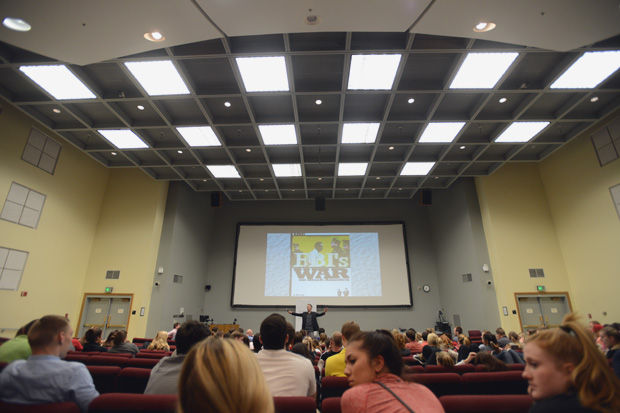Continuing the conversation
April 14, 2015
Charles Weller, an instructor with the department of history, screened graphic photographs and paintings of 19th century lynching during a Greek programing event in Todd Auditorium last night. More than 200 Sigma Phi Epsilon and Alpha Gamma Delta (AGD) members sat beneath the projection silently.
“I always feel uneasy sharing these pictures,” Weller said. “But you’ve got to take it in. You’ve got to understand the depth.”
His presentation was part of a cultural competency initiative being undertaken by the executive board of Sigma Phi Epsilon and their philanthropic partners AGD.
“We want to do something bigger than ourselves,” Sigma Phi Epsilon public relations chair Eric Bjerkestrand said. “We want to do something big enough to gain attention.”
The fraternity began taking action under sophomore member Shane Hopkins’ leadership back in February when racial incidents on WSU’s campus and other university grounds across the nation put the negative aspects of Greek life on blast, Bjerkestrand said. Sigma Phi Epsilon chair members wrote a pledge for cultural competency, and then strategized what kind of exposure they would give it.
The pledge, which is awaiting approval to be posted in the Compton Union Building, states that the members of Sigma Phi Epsilon and AGD will become more aware of every race, creed and orientation. Additionally, they will create a culture that is more accepting by attempting to eliminate all racist and derogatory language and action from their daily life.
Kyle Strachila, Sigma Phi Epsilon’s membership development chair, said they liked the principle of the pledge, but didn’t want the statement to end there.
Based on conversations with the WSU Black Student Union, Sigma Phi Epsilon’s executive board decided cultural competency would gain more momentum if they required their members to sit through an educational program before signing the document, Strachila said.
The original idea was to have the pledge available for all community members to sign, Bjerkestrand said. However, the responses that would be received seemed too artificial.
“We want to be proactive,” Strachila said.
In order to be proactive, a better understanding of the history each member is working against is necessary. Strachila and Bjerkestrand said the future cannot be changed within the Greek community without understanding the root of the issue. This is the reason they called on Weller.
In less than half an hour, he took his audience through a crash course on religious, ethnic, racial, gender, physical, and sexual discrimination.
He prefaced his presentation with discriminatory actions taken against himself during his 14-year stay in various regions of Asia. As a six-foot three-inch, sandy-haired and blue-eyed Caucasian male, he didn’t belong.
“It wasn’t extreme but I still had to deal with it,” he said. “I’m very glad for that in terms of being able to relate.”
Using the civil rights movement in the United States, and the 400-year history of oppression that preceded it, Weller made it clear that racism is something our culture has ingrained in all of us. He also made it clear that it’s something we can work against.
Weller used paintings and museum recreations of slave transportation to drive home the brutality of the Atlantic slave trade. He used images of the KKK, pictures of lynching, and video clips of Malcom X to help present a broader understanding of modern oppression.
“Look at that picture,” Weller said, pointing to a group of more than 50 men in a picture standing around a black man hanging from the ceiling of a bar. “You see these guys huddling around and taking their picture and celebrating this kind of behavior?”
The room was silent.
“Yeah,” he said, acknowledging their surprise.
Weller went on to explain that Native American’s experienced this same kind of oppression from early colonizers and 19th century presidents of the U.S. Hispanic individuals were attacked along the southern boarder for centuries, Chinese individuals where pressured out of California, and Japanese individuals were harassed during both World Wars.
“All of this is intermingled,” he said.
However, he cautioned that while his crash course is important, the issues presented are something that need to be continually researched.
“Let’s not make this too simplistic because it is complex,” he said. “But the overarching cause of this is racism.”
After playing a clip from the film “Malcom X” to elaborate on his last statement, he opened the floor for 15 minutes of conversation.
Members talked about what racism is and challenged each other to stand up for what they believe. Several students challenged the idea that, if the Greek community is perceived by some to be an elite group of students, then they need to act elite by being culturally inclusive.
This discussion allowed the members to safely say what was on their mind and reflect on the content that had been presented to them. Nothing was fully representative of their community or their final stance on the issues at hand.
Before the presentation came to a close, a student asked Weller for advice on how Greek students can help the entire community become more culturally aware.
“Don’t be overly artificial about stuff,” he said. “Approach people as naturally as can be.”
He encouraged members to go out of and begin interacting with as many people as possible. He encouraged them to begin exploring different friendships, practicing better behavior, and supporting others who already achieve this.
“We just need to get it into our hearts,” he said. “I’d hope it’s already there.”
Sigma Phi Epsilon hopes the Interfraternity Council will pick up their program and make it something available for the entire Greek community next year. AGD is in full support of future programming.
“This event isn’t going to change everything,” Bjerkestrand said. “But it’s small steps that will make a difference. It’s the start of a movement.”
Reporting by Lance Lijewski
*This article has been updated for accuracy*





















